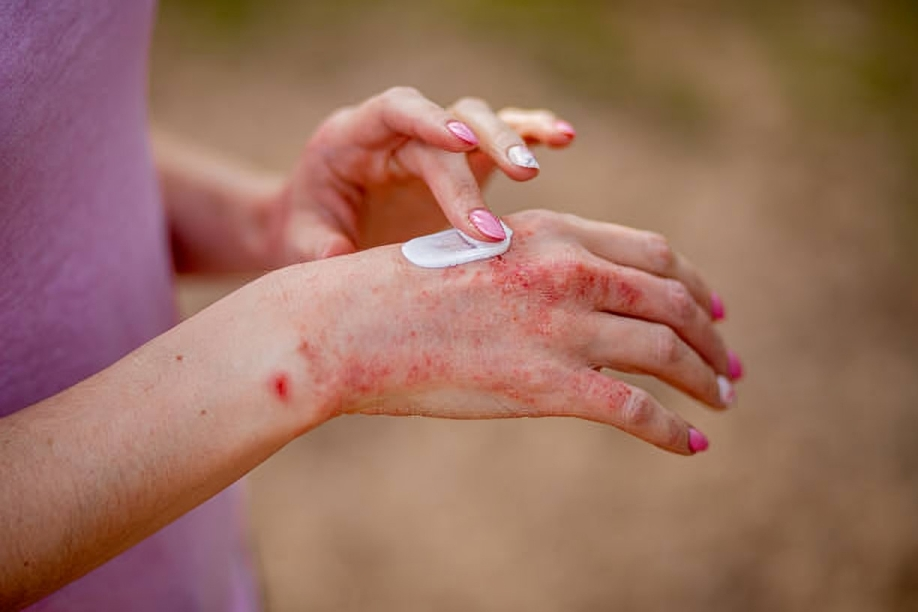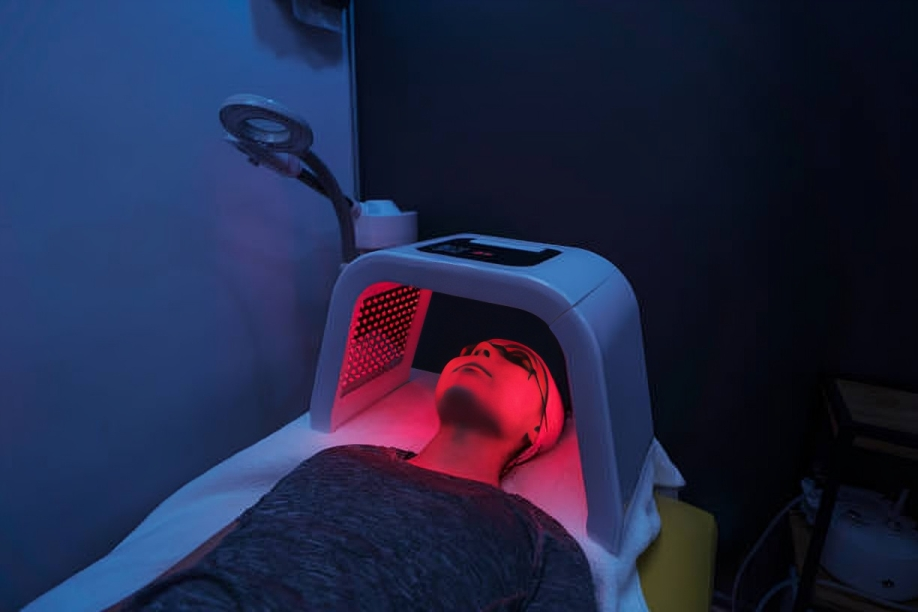Nummular Eczema is a chronic inflammatory skin condition characterized by the formation of well-defined ring-shaped or oval inflammatory patches on the skin that cause severe itching and crusting. The prognosis of this disease is very good because it responds well to treatment.
What is Nummular Eczema?
Dermatitis is a very common skin pathology. It is a type of dermatitis. It is also named nummular dermatitis or discoid eczema. Nummus is a Latin word meaning “coin.” Nummular eczema causes the formation of coin-shaped, itchy lesions on the skin that usually involve the flexor surfaces of your upper and lower extremities.
Generally, it is a chronic condition that may last for a week or month and have recurrent episodes for long periods of time.1NHS inform. (2023, November 9). Discoid eczema | NHS inform. NHS Inform. https://www.nhsinform.scot/illnesses-and-conditions/skin-hair-and-nails/discoid-eczema/
How common is Nummular Eczema?
Nummular eczema is a very common skin condition. It has a dual distribution depending on the patient’s age and predominantly affects females between the ages of 15 and 25 and males between the ages of 50 and 60. It can also affect children.2Mrcgp, O. S. (2023, April 12). Discoid eczema. https://patient.info/skin-conditions/atopic-eczema/discoid-eczema
Types of Nummular Eczema
It is a type of dermatitis subdivided into two types. These are:
Wet Nummular Eczema:
Wet-nummular eczema is an acute inflammatory skin condition that usually goes off after a week or months. It most commonly involves males of age above 50 years. It usually occurs at the site of trauma or infection. This skin condition can also occur as a result of drug allergy.
In wet nummular eczema, blisters or pustules are formed that sometimes ooze clear fluid, causing pain and itching. The distribution of wet Nummular eczema is usually symmetrical.
Dry Nummular Eczema:
Dry nummular eczema occurs due to dry skin conditions. Causes include retinoid complications, atopy, and excessive use of soap and water that makes your skin dry. It is also associated with other skin conditions like seborrhoeic keratosis.3Dermatitis. Nummular dermatitis | DermNet. (n.d.). https://dermnetnz.org/cme/dermatitis/nummular-dermatitis

Causes & Risk Factors for Nummular Eczema
The causes and risk factors include the following:
Dry Skin Conditions:
The exact cause of Nummular eczema is unknown. However, multiple factors can cause it. Xerosis (Dry skin) is the most common predisposing factor. People with a history of atopic dermatitis usually present with this condition. Skin trauma, insect bites, or small abrasions can also trigger this condition.
Contact Dermatitis:
Contact dermatitis can also cause nummular eczema. Chemicals and irritants in soaps, sensitizers, and other products make your skin dry and increase the risk of nummular eczema. These Include:
- Cobalt
- Nickel and Nickel sulfate
- Neomycin sulfate
- Mercury
Breast Eczema:
Nummular eczema can also involve the breast in patients undergoing a mastectomy followed by breast reconstruction. It results from the insertion of the tissue expanders and grafts.
Drugs:
Some drug therapies can also cause this condition. These include the following:
- Interferon therapy for hepatitis C
- Exposure to mercury
- Tumor necrosis alpha factor blocking therapy
- Guselkumab
Infections:
Nummular eczema rarely occurs as a result of infections. But some infections can cause it. These infections include:
- Giardiasis
- H pylori infection
- Dental infections
Temperature Changes:
Most skin conditions are temperature-dependent. Nummular eczema tends to occur more commonly in cold environments, which makes the skin dry and more prone to discoid eczema.
Stress:
Stress rarely causes eczema, but it usually flares up the discoid eczema.
Other Conditions:
Other conditions, such as stasis dermatitis, varicose dermatitis, and edema, can also trigger nummular eczema, which usually involves the lower extremities.
Symptoms of Nummular Eczema
Eczema lesions begin with the formation of papules or vesicles that combine to give a plaque-like appearance. These lesions have a symmetrical distribution with well-defined borders, a coin-shaped appearance, underlying erythema, and an eczematous plaque with a size between 1 and 10cm. Chronic lesions of Nummular eczema resemble lichenification. 4National Eczema Association. (2021, December 2). Nummular Eczema – Symptoms and causes | National Eczema Association. https://nationaleczema.org/eczema/types-of-eczema/nummular-eczema/
It usually involves the lower extremities, upper extremities, and trunk. The scalp and face area is not affected. The symptoms of these lesions include:
- Milder, moderate or severe itching
- Oozing fluid from the lesions
- Crusted plaque-like appearance
- Red, scaly, and inflamed skin around the lesions
- Hypo or hyperpigmentation
- Secondary infection
Stages of Nummular Eczema
This condition is staged into three categories. These include:
Acute:
It is the beginning phase of eczema, in which a person experiences noticeable symptoms, including itching, scaling, and erythema. Lesions are present in limited areas of the body.
Subacute:
Subacute eczema is the phase between the acute and chronic stages of eczema. In this phase, the skin becomes flaky and cracked.
Chronic:
In this phase, the lesions start progressing all over the body with severe pruritus. The scales and crust become more prominent. Infection can also occur.5Robinson, C. A., Love, L. W., & Farci, F. (2022). Nummular Dermatitis. In StatPearls. StatPearls Publishing.
How to diagnose Nummular Eczema?
Usually, it’s diagnosed clinically based on its characteristic coin shape of erythematosus lesions. However, a dermoscopic evaluation can also help diagnose this disease. The diagnosis of nummular eczema is based on history, physical examination, and laboratory investigations.
History:
In history, your doctor will ask some questions about your skincare. These include the following:
- What do you do?
- Which soap do you use?
- Do you have itching?
- Does it bleed or not?
Physical Examinations:
During the physical examination, your doctor will examine your body to check the sites, distribution, color, size, and appearance of the lesion.
Dermoscopy:
Dermoscopy is a simple procedure in which your doctor closely observes your skin. Dermoscopic findings of nummular eczema include shiny red clods with an irregular distribution of red-brown globules.
Scrapping for fungal Hyphae:
This test is used to rule out fungal infection. In this test, your dermatologist scrapes material from your affected area on a slide, dissolves it in KOH, and waits 3-4 hours. If fungal hyphae are present on microscopic examination, it is called a fungal infection. Otherwise, the fungal infection will be ruled out.
Laboratory Investigations:
Laboratory investigations are usually not required in Nummular eczema. However, laboratory investigations of resistant or recurrent eczema are advised. These investigations include:
- Complete blood count
- Serum IgE level
- Liver function tests (LFTs)
- Stool antigen test for H pylori
Skin Biopsy:
Skin biopsy is advised in rare cases where lesions are chronic and do not respond to treatment. In this procedure, a sample of your skin tissue is taken and sent to the pathologist for investigation.6Robinson, C. A., Love, L. W., & Farci, F. (2022, October 3). Nummular dermatitis. StatPearls – NCBI Bookshelf. https://www.ncbi.nlm.nih.gov/books/NBK565878/
How to treat Nummular Eczema?
Multiple treatments for Nummular eczema include topical applications, systemic treatment, and lifestyle changes. The prognosis of Nummular eczema is excellent, and it responds well to treatment. The main aim of treatment is to restore the natural skin barrier and change behavior that makes your skin dry and itchy. The treatment includes:
Topical Therapy:
There are multiple topical applications that you can apply on your skin, according to the advice of your doctor. The topical medicines include:
Emollients
People with eczema often have dry skin that triggers the existing eczema. Therefore, Emollients, also called moisturizers, are advised to moisten the skin. A variety of Emollients are available in markets. It’s better to try these Emollients and see which one suits your skin best.
If the affected area is wet, that is a sign of infection. Therefore, emollients with antimicrobial properties are advised in this case.

Steroids
The skin around eczema becomes erythematous (inflamed), itchy, dry, and crusted. A high-potency topical Steroid ointment is advised, and it should be applied 2-3 times daily to the affected area. Once the lesion is improved, low-potency topical steroids are advised to prevent skin atrophy.
If the lesion is infected, a mixture of steroids and antibiotics, e.g., beta-genetic (betamethasone and gentamicin) ointment, is advised. Steroids reduce inflammation, and antibiotics reduce bacterial colonization.
Immunomodulators
Immunomodulators are anti-inflammatory and have better efficacy against eczema. Immunomodulatory include tacrolimus and pimecrolimus. These agents reduce inflammation by suppressing the release of inflammatory substances in the affected areas.
Antibiotics
Topical antibiotics, such as mupirocin, are suitable for a superadded infection. Other antibiotics, neomycin and bacitracin, cause sensitization, so it is better to avoid them.
Baths & Shower:
Bathing and taking a shower makes you more comfortable if you have eczema. Bathing reduces inflammation and crusting in eczema. Although, a bath with hot water should be avoided because it aggravates the eczema.
Oral Medications:
Some Oral medications are given in severe forms of eczema. The Oral medications include:7Leung, A. K. C., Lam, J. M., Leong, K. F., Leung, A. A. M., Wong, A. H. C., & Hon, K. L. (2020). Nummular Eczema: An Updated Review. Recent patents on inflammation & allergy drug discovery, 14(2), 146–155. https://doi.org/10.2174/1872213X14666200810152246
Steroids
Oral steroids are potent anti-inflammatory and reduce the flares of eczema. Doctors recommend gradually reducing high doses of steroids over time to prevent steroid-induced complications. In severe cases of eczema, they may administer parental or intravenous steroids.
Antihistamines
To treat itching and inflammation, doctors recommend antihistamines such as H1 blockers, including loratadine, desloratadine, and ebastine. Topical antihistamines should be avoided because they can be potent sensitizers.
Cyclosporine
Cyclosporine is an alternative to steroids. Regular monitoring of renal function and blood pressure is required.
Antibiotics
Oral antibiotics are suitable when there is an infected eczema. These antibiotics include:
- Doxycycline
- Erythromycin
- Cephalexin
Immunosuppressive Agent
Oral immunosuppressants such as methotrexate also help to treat eczema by suppressing inflammatory mediators.
Phototherapy:
UV phototherapy can also help to treat eczema. Usually, broadband or narrow UVB is used to treat eczema. However, psoralen UV (PUVA) can also be used in severe cases.8Miller, J. L., MD. (n.d.). Nummular dermatitis (Nummular eczema) treatment & management: approach considerations, medical care, consultations. https://emedicine.medscape.com/article/1123605-treatment#d7

How can I prevent Nummular eczema?
This condition responds well to medical therapy, but recurrence is common. However, you can follow some preventive measures and lifestyle changes that decrease the risk of getting nummular eczema. These include:
- Do not use wool stuff clothes that may trigger your eczema
- Do not take excessive baths with hot water
- Avoid using harsh soaps that make your skin dry
- Manage stress that can trigger eczema
- Moisturize your skin daily after taking a bath
- Prevent skin injury
- Do not rub your skin harshly
- Avoid eating chocolates and nuts
- Do not keep pets in your house that can trigger eczema
- Do not wear tight clothes
- Avoid using perfume and powders
- Complete Vaccination status of your child
- Avoid hydrogenated oil foods such as French fries
- Do not consume red meat and fatty foods that contain unhealthy fats
- Don’t consume foods containing omega-6 fatty acids, such as corn
- Do not eat a high-sugar diet
- Eat a healthy diet that includes fish containing omega-3 fatty acids, turmeric and ginger (which have anti-inflammatory properties), olive oil (a good source of unsaturated fats), gluten-free foods, and fresh fruits and vegetables.
Nummular Eczema Vs. Ringworm
Nummular eczema and ringworm (tinea) have the same ring-shaped lesions On the body. However, the clinical picture and management are different.
Ringworm (tinea) infection is contagious. The causative agent is a fungus. It can also involve your face, but Nummular eczema is not a fungal infection and does not involve your face.
The clinical picture of ringworm infection is the same as that of nummular eczema, but it has central clearance, which is not present in Nummular eczema. The scrapping sample shows fungal hyphae in KOH in the ringworm infection, which is not present in Nummular eczema.9Brazier, Y. (2023, April 24). What is discoid eczema? https://www.medicalnewstoday.com/articles/182794#medical-treatment
Nummular Eczema Vs. Psoriasis
Eczema and psoriasis pictures are difficult to pick, but some key points can help diagnose them.
Eczema causes more itching than psoriasis. In eczema, thick, scaly plaques are formed that sometimes ooze fluid. However, in psoriasis, thick silver plaques form that bleed when scratched. In eczema, the affected skin is scaly and crusty, while in psoriasis, the skin is scaly and silvery.
Is Nummular Eczema Contagious?
No, Nummular eczema is not a contagious disease. It is a Chronic inflammatory disorder of the skin that does not spread from person to person with direct contact.
What triggers Nummular eczema?
Some environmental factors may trigger nummular eczema. For example, contact with household detergents can trigger your eczema. Therefore, avoid using household detergents and use soap that suits your skin or according to your doctor’s advice.
Dry air can aggravate eczema. Therefore, always place a water bowl near your heater or radiator to moisten dry air. Winters can trigger your eczema because, in winter, your skin becomes dry. Moreover, use moisturizers or lotions to make your skin smooth and moist.
Conclusion
To conclude, it is a skin condition that forms coin-like or ring-shaped inflammatory patches. It presents with itching, oozing fluid, patches of hyperpigmentation, crusting or sucking, redness of the skin, and secondary infection. Topical therapies and oral medications can effectively treat nummular eczema. This condition can flare up in cold and dry weather. However, preventive measures can effectively control the severity of symptoms. If you or your loved ones have these signs and symptoms, consult a dermatologist for prompt diagnosis and treatment.
Refrences
- 1NHS inform. (2023, November 9). Discoid eczema | NHS inform. NHS Inform. https://www.nhsinform.scot/illnesses-and-conditions/skin-hair-and-nails/discoid-eczema/
- 2Mrcgp, O. S. (2023, April 12). Discoid eczema. https://patient.info/skin-conditions/atopic-eczema/discoid-eczema
- 3Dermatitis. Nummular dermatitis | DermNet. (n.d.). https://dermnetnz.org/cme/dermatitis/nummular-dermatitis
- 4National Eczema Association. (2021, December 2). Nummular Eczema – Symptoms and causes | National Eczema Association. https://nationaleczema.org/eczema/types-of-eczema/nummular-eczema/
- 5Robinson, C. A., Love, L. W., & Farci, F. (2022). Nummular Dermatitis. In StatPearls. StatPearls Publishing.
- 6Robinson, C. A., Love, L. W., & Farci, F. (2022, October 3). Nummular dermatitis. StatPearls – NCBI Bookshelf. https://www.ncbi.nlm.nih.gov/books/NBK565878/
- 7Leung, A. K. C., Lam, J. M., Leong, K. F., Leung, A. A. M., Wong, A. H. C., & Hon, K. L. (2020). Nummular Eczema: An Updated Review. Recent patents on inflammation & allergy drug discovery, 14(2), 146–155. https://doi.org/10.2174/1872213X14666200810152246
- 8Miller, J. L., MD. (n.d.). Nummular dermatitis (Nummular eczema) treatment & management: approach considerations, medical care, consultations. https://emedicine.medscape.com/article/1123605-treatment#d7
- 9Brazier, Y. (2023, April 24). What is discoid eczema? https://www.medicalnewstoday.com/articles/182794#medical-treatment

